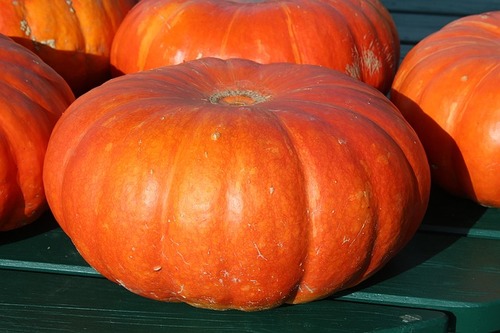Is Pumpkin Bad For You?
Also Known As: winter squash
Short answer
All in all, pumpkin is a nutrient-dense superfood that comes with many health benefits. The only real cause for concern is how much vitamin A they contain, making it very easy to take in too much.
Recommended Alternative
Very healthy and numerous health benefits. Harmful qualities may be associated, but aren't usually serious.
View Full Grading System
Category 'A'
Very healthy and numerous health benefits. Side effects are rare. Things rated an 'A+' are typically necessary for survival (for example, water).
Very healthy and numerous health benefits. A few harmful qualities may be associated, but only under certain circumstances such as an allergic reaction.
Very healthy and numerous health benefits. Harmful qualities may be associated, but aren't usually serious.
It is important to note that even the best things in life can become bad in immoderate amounts. So, although something may be rated an 'A+', overconsumption/overdoing can bring unwanted effects.
Category 'B'
Very beneficial to your health. Things rated a 'B+' may have a few harmful qualities to pay attention to.
Overall beneficial to your health. Things rated a 'B' may have some harmful qualities to pay attention to.
More beneficial to your health than not. However, harmful qualities are most likely associated and shouldn't be overlooked.
The main difference between category 'A' and category 'B' is the harmful qualities typically present in 'B' items. Serious side effects are usually uncommon, but are still possible and should be taken note of.
Category 'C'
Both beneficial and harmful qualities associated. Things rated a 'C+' are typically a bit more on the beneficial side. Still, moderation is important.
A fairly even ratio of beneficial and harmful qualities. Moderation is important. Very general topics that can lean towards both sides of the spectrum will be placed here as well. Rice, for example, can be good or bad depending on the type.
More harmful than beneficial. Side effects are common, especially when consumed/done excessively. Moderation is very important.
Category 'C' usually denotes to both good and bad qualities. When it comes to this category, it is important to keep this word in mind: moderation.
Category 'D'
Harmful to your health. Although benefits may be associated, the bad most likely outweighs the good. Moderation is very important.
Harmful to your health. A few benefits may be associated, but the bad outweighs the good. Moderation is extremely important.
Harmful to your health. Very few, if any, benefits are present. Things in this category should be avoided as much as possible.
Category 'D' is typically for things that are more harmful than beneficial. While consuming/doing something unhealthy once in a blue moon shouldn't hurt, we definitely recommend eliminating 'D' items as a regular part of your routine/diet.
Category 'F'
Category 'F' is for things that fail to bring anything beneficial to the table, and are very harmful to your health. We recommend completely avoiding anything in this category. Long-term side effects of 'F' items are usually very serious.
Category 'N'
'N' stands for neutral. Things placed into this category are generally (a) neither good nor bad for you, or (b) lack the necessary evidence to reach any conclusions.
Long answer
Although much of the health benefits found in pumpkin are from its seeds, the fruit itself does provide quite a few benefits. For one, it is a good source of many minerals such as copper, calcium, potassium, and phosphorous. Many vitamins, such as the B-complex vitamins, vitamin C, and vitamin E are also found in pumpkin. The most abundant, though, is vitamin A, which along with zeaxanthin (an antioxidant carotene also found in abundance in pumpkin) helps promote healthy eyes and prevent diseases such as macular degeneration Alzheimer's and Parkinson's
With just 26 calories per 2/3 cup (100 grams) and neither saturated fat nor cholesterol, pumpkin is a good choice for those trying to get their daily nutrients and maintain or lose weight. Pumpkin, which provides three grams of fiber per cup, also contribute to a healthy colon and properly functioning digestive system. Furthermore, adequate amounts of fiber help rid the body of excess LDL cholesterol, helping to prevent cardiovascular diseases.
If you eat pumpkin with the seeds, then you will gain the additional benefits of zinc, phytoestrogen, and tryptophan, just to name a few. These improve sexual health in men, prevent hypertension, and help the body create serotonin, respectively. One thing to be careful of is not to eat too much pumpkin - though rare, vitamin A toxicity is possible. Symptoms of vitamin A toxicity include, but are not limited to, blurry vision, swelling of the bones, bone pain, poor appetite, dizziness, nausea and vomiting, sensitivity to sunlight, dry skin, itchy skin, and confusion.
Possible short-term side effects
Benefits
- great source of antioxidants
-
helps prevent cardiovascular disease
-
helps prevent colon cancer
-
helps maintain a healthy digestive system
-
helps reduce "bad" cholesterol levels
-
promotes a healthy immune system
-
promotes healthy eyesight
Our Wellness Pick
(what is this?)
Organic Pumpkin Puree
- Rich in vitamins
- USDA Organic
- Non-GMO Project Verified
- BPA-free cans
- Convenient pack of 12
Learn More!
Please turn your Ad Blocker off to see this content. Thank you!
Thank you for your feedback!
Written by Jeff Volling
Published on: 01-07-2016
Last updated: 12-15-2023
Thank you for your feedback!
Written by Jeff Volling
Published on: 01-07-2016
Last updated: 12-15-2023

 Approved by
Approved by 















